What is the fastest car in the world?
The world’s fastest cars revealed, including the overall fastest car plus the quickest road cars
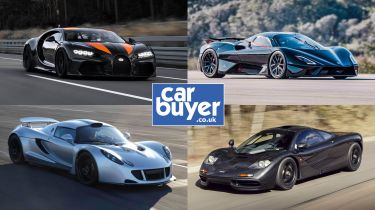
The significance of a car's top speed has changed over the years. It was once a relevant factor for new car buyers, but since cars can now surpass national speed limits, it's now more about bragging rights and marketing, especially for supercars and hypercars.
Car manufacturers compete to engineer the fastest car, even if only a few are sold at a loss. Being the manufacturer with the fastest car in the world is a big selling point for other models in the range.
In the middle of the 20th Century it was individuals such as Donald Campbell who built dedicated machines to beat land-speed records, but later attempts for the ultimate record – the speed of sound – were proving to be exceptionally expensive to achieve.
Instead, it was the fastest road car record that carmakers chased. This brought us models such as the McLaren F1, which was fully road-legal but managed an incredible 240.1mph. Even today that speed is unusual, even amongst supercars, but there are some models that have beaten the F1’s record.
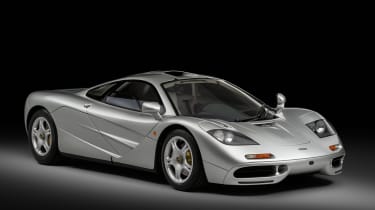
These days you need to be getting close to – or beating – the 300mph barrier if you want your car to be amongst the world’s fastest. Since forces such as drag and rolling resistance are exponentially harder to overcome at higher speeds, it’s much harder to get from 200 to 300mph than from 100 to 200mph.
Read on to learn about the fastest cars ever. We’ll answer the key question first (spoiler: it’s a jet-powered car driven by a trained pilot) before we reveal the fastest road cars ever made as well.
What is the fastest car in the world?
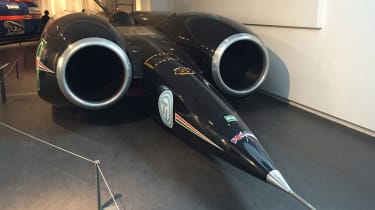
The holder of the land speed record is currently the Thrust SSC, a British jet car that weighs nearly 10 tonnes. It has the equivalent of 102,000bhp and, in 1997, hit 763mph in a Nevada desert. Thrust SSC is the first car to officially break the sound barrier. There’s a car called Bloodhound SSC in development, which theoretically could reach 1,000mph, but its future is uncertain.
What’s the fastest road-legal production car in the world?
To be officially recognised as one of the fastest cars in the world, a car needs to do a two-way run. The two attempts are averaged out to account for weather and wind conditions, and this is the speed that’s recorded. At least 20 examples of the car also need to have been produced. Not all the fastest cars in the world have managed to meet these rules, though. Here are the fastest road cars in reverse order:
SSC Ultimate Aero - 256.18mph
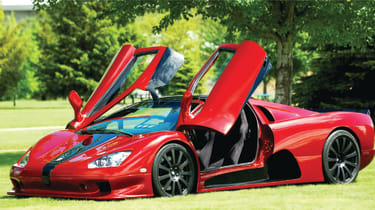
The SSC Ultimate Aero is powered by a 1,183bhp twin-turbocharged V8 petrol engine. During its seven-year production run, it managed to steal the fastest car title from the Bugatti Veyron with a top speed run of 256.18mph. It's also worth mentioning that this figure was achieved on a public road, with the car maker using a temporarily closed two-lane highway near its factory in the state of Washington, USA.
Bugatti Veyron Super Sport - 267.86mph
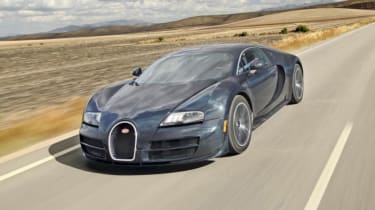
While the standard Bugatti Veyron wasn’t exactly slow with a top speed of over 253mph, the Veyron Super Sport sought to push the boundaries of physics slightly further with various aerodynamic tweaks and an increased power output of 1,184bhp (up from 987bhp). Limited to 30 examples, the Super Sport was successful in regaining the fastest car record from SSC in 2010 with a recorded speed of 267.86mph at the Ehra-Lessien test track in Germany.
Hennessey Venom GT - 270.49mph
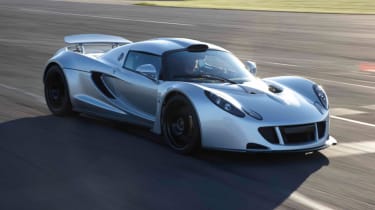
In 2014, American tuner Hennessey took the record back to North America with their Venom GT hypercar. The record run was completed on the 3.2-mile runway at the Kennedy Space Centre in Florida, with a one-way recorded speed of 270.49mph. Controversially, a run in the opposite direction was never completed, meaning the attempt didn’t qualify as an official world record. It still left us in awe, though.
Koenigsegg Agera RS - 277.87mph
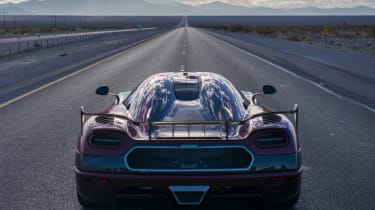
Koenigsegg upped the ante in 2017 by increasing the speed record even further still, while simultaneously recording the highest speed ever achieved on a public road. Using a closed 11-mile stretch of highway in Nevada, USA, the Swedish hypercar maker ran a customer-owned Agera R to a speed of 277.87mph. Not only was the car borrowed from a customer but it was also unmodified, producing 1,360bhp in its factory specification.
SSC Tuatara - 282.9mph
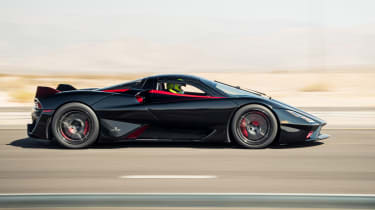
The SSC Tuatara managed a speed of 316.11mph in 2020 on a closed stretch of Nevada highway. However, the record speed was quickly debunked due to controversy surrounding the video of the attempt.
In 2021, the company made another record speed attempt using a more accurate timing system, reaching a two-way average of 282.9mph during its preliminary runs - beating the previous two-way record set by the Koenigsegg Agera RS.
The SSC uses a 5.9-litre V8 with two turbochargers, producing 1,750bhp and 1,735Nm of torque. It’s aerodynamically designed to break the 300mph barrier, and has a carbon-fibre shell to keep weight down.
The record speed of 282.9mph was achieved in a SSC Tuatara driven by owner Dr. Larry Caplin, who used his own personal car for the run. After the attempt, he said “I got a taste of full power in the top of seventh on the last run. I am excited to come back and break 300mph.”
Bugatti Chiron Super Sport - 304.77mph
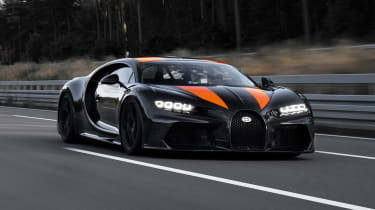
In 2019, Bugatti regained the world’s fastest car accolade with the Chiron Super Sport. Like the Veyron Super Sport before it, only 30 examples are slated for production, with the car managing to hit 304.77mph at the Ehra-Lessien test track.
The Chiron’s record has attracted some controversy though, because its record-breaking speed was only recorded in one direction, unlike the attempts by Koenigsegg and SSC which both used the overall average speed of two runs in opposite directions on the same stretch of road.
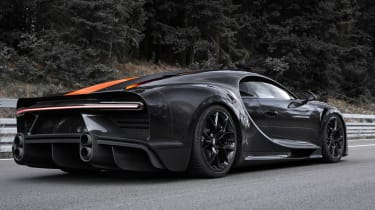
The Bugatti Chiron Super Sport is powered by a tweaked version of the standard Chiron’s 8.0-litre W16 engine, which itself was used in the Bugatti Veyron from 2005 onwards. It might be easier to think of the engine as two 4.0-litre V8s joined together, which then has four turbochargers bolted on. Total power stands at an astonishing 1,578bhp - 99bhp more than the ‘regular’ Chiron. Amazingly, the four-wheel-drive system and gearbox are unchanged.
Read our guides to the best drivers’ cars and the best supercars on sale now, or check out our guide to keeping your tyres in top condition.
Most Popular
Tips & advice

Car dashboard warning lights: what does each symbol mean?

Electric car charging stations: public networks, charger types, apps and maps







